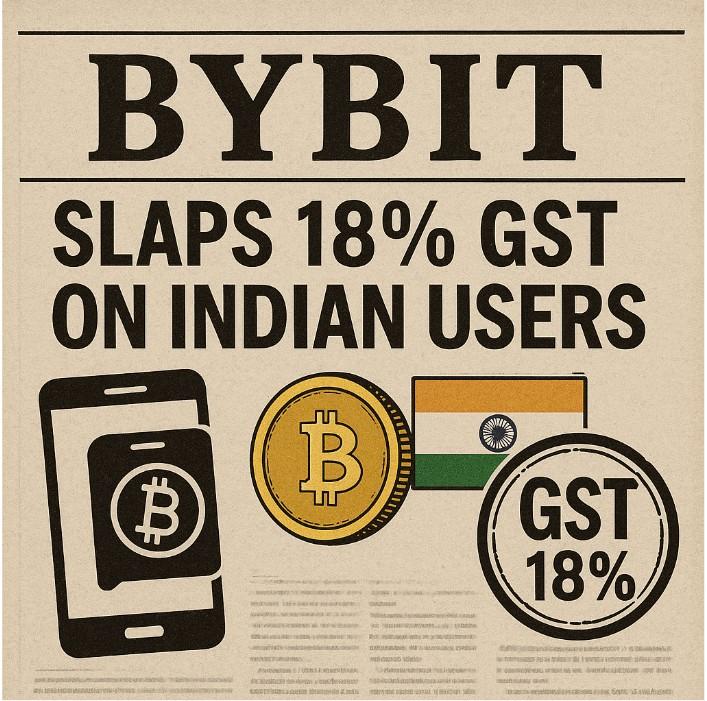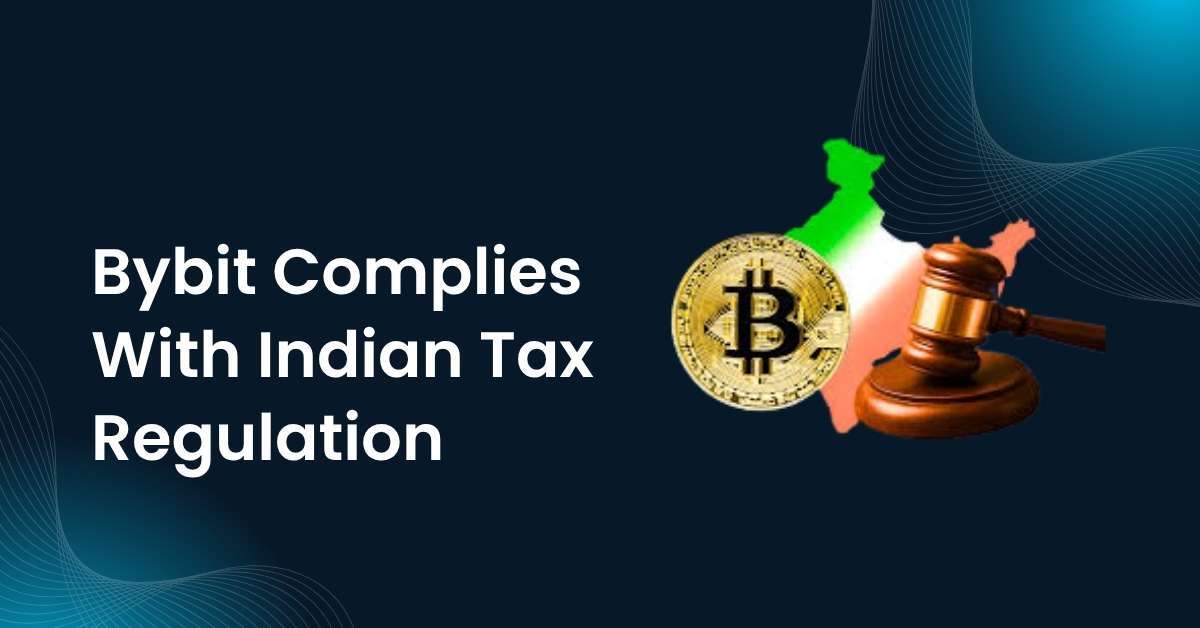Bybit implements Indian Tax rules for its users in India, bringing a clear change in how crypto trading works on the Bybit exchange. This Bybit news matters for people using the Bybit app and following updates around crypto rules in India.
From July 7, 2025, Bybit India users will pay 18 percent GST on all trading and service fees. This Bybit update comes alongside existing crypto taxes and affects regular trades on the platform.
Here’s a quick overview of Bybit in India, its legal clarity, and how Indian users are affected by these changes.
Bybit 18% Tax Compliance In India: Key Takeaways
- Indian crypto traders now face 30% profit tax, 1% TDS, and 18% GST, creating one of the world’s most expensive trading environments.
- Bybit will discontinue crypto loans, card services, and trading bots for Indian users starting July 9, 2025.
- Bybit’s proactive GST implementation may influence other exchanges to adopt similar compliance measures in India.
Bybit 18% GST Implementation – All You Need To Know
The 18% GST that Bybit implemented as a tax reflects India’s taxation framework responsibilities for Virtual Digital Asset Service Providers (VDASPs).
This tax framework affects nearly every aspect of crypto trading and services performed on the platform, significantly altering the cost structure for Indian traders.

The GST applies to various service classifications, with different implementation processes.
1. Both spot and margin trading
The GST is deducted directly from the assets received, so the user sees on their statements that they sold their cryptocurrency and a deduction in GST along with the other transaction fees, which they no longer consider as net proceeds because GST reductions are kept as a balance.
This ensures taxes are collected along with maintaining total transparency for transactions.
2. For derivatives trading
Provided these trades in derivatives will be treated similarly, consistent with the GST charged on top of any fees charged to the user by the trading platform.
This also includes fees that have a cost component associated with orders containing Initial Margin and Maintenance Margin and the overall trade will carry a cost component of 18% GST added to the fees.
This will obviously include open interest considerations for everything, perpetual contracts, expiry contracts, options trading, and spreads into USDT, USDC, and inverse market segments.
3. Fiat transactions
Fiat transactions will contain GST applied to both services through deposit and withdrawal options and ONE Click Buy, Bank card purchases and Auto-investment.
The exchange advises that GST applies to services from transaction products, which can include buy-sell price spreads classified as platform services in Indian taxation.
4. Crypto Withdrawals
Crypto withdrawals will now include GST considerations for all withdrawal fees across standard withdrawals, recovery of incorrectly identified deposits and withdrawals that require corrections involving tags/memo.
5. Convert Tool, OTC Trading & Small Balance Conversion
Conversion services, OTC, and small balance conversions will be subject to GST on spread amounts considering the service component built in.
6. Unified Trading Account (UTA)
The Unified Trading Account is subject to GST when there are any conversion transactions, including manual repayments, auto-repayments, and liquidations with token conversions.
However the GST applies in these cases solely to conversion fees (noted that a UTA borrower is paying the fees but not the interest ), and represents some form of relief in these situations.
Disclaimer:
Please treat the examples listed here as only a general overview of circumstances where GST may be charged. Bybit also reserves the right to apply GST to applicable scenarios that are not necessarily listed here as Bybit’s product offerings change from time-to-time.
Financial Impact on Indian Crypto Users
The 18% GST implementation creates a substantial financial burden for Indian crypto traders already facing restrictive tax environments.
This compounds the existing 30% profit tax and 1% TDS obligations.

Here’s a practical example:
Selling Bitcoin worth 100,000 USDT with a 0.1% trading fee now costs an additional 18 USDT in GST, reducing proceeds from 99,900 to 99,882 USDT.
While seemingly modest, cumulative effects across multiple transactions significantly impact profitability.
Active traders, arbitrageurs, and professional firms face substantial cost increases, which may necessitate strategic adjustments or platform migrations.
Market observers anticipate shifts toward decentralized exchanges, though such strategies carry compliance risks.
Bybit Service Discontinuation and Platform Changes From 9th July 2025
Bybit is making major changes for Indian users starting July 9, 2025, alongside the 18% GST implementation.
Key services like:
- Legacy crypto loans,
- Bybit Card, and
- All trading bots (Spot Grid, DCA, Futures Grid, etc.) will be discontinued.
Existing crypto loans must be repaid by July 17 to avoid forced liquidation. Bybit Card users will face blocked transactions from July 17, and no new applications will be accepted after July 9.
Trading bots will be shut down completely, requiring manual strategy management.
These moves signal Bybit’s strategic shift toward core trading services, aiming to reduce regulatory risk and operational complexity in India’s evolving crypto landscape. Users must act quickly to adjust to these upcoming limitations.
If users have any queries and concerns, you can reach out to the Bybit custom support team by raising a case through this form.
Crypto Taxation and Legality in India
India’s cryptocurrency regulatory framework represents one of the world’s most stringent approaches to digital asset taxation. The current structure combines multiple tax layers designed to capture revenue while controlling crypto adoption rates.

The 30% tax on crypto profits, implemented in 2022, treats digital assets as speculative investments rather than legitimate financial instruments.
The 1% TDS requirement on every transaction creates additional compliance burdens while generating consistent government revenue.
Bybit’s move follows increasing regulatory clarity around crypto taxation and legality in India, where platforms are now expected to comply with GST and TDS provisions.
Reasons Behind Bybit’s Regulatory Compliance
Bybit’s announcement emphasizes its commitment to regulatory compliance, acknowledging the inconvenience caused while prioritizing legal adherence.
The exchange’s proactive approach demonstrates recognition of India’s importance as a crypto market despite challenging regulatory conditions.

The platform’s transparency regarding GST visibility in transaction histories shows dedication to user education and compliance support. Users can track GST charges alongside respective fees, enabling better financial planning and tax record maintenance.
This compliance strategy positions Bybit as a responsible player in India’s evolving crypto landscape, potentially providing competitive advantages as regulations stabilize.
The exchange’s willingness to absorb operational complexities while maintaining services demonstrates long-term commitment to the Indian market.
Industry Implications and Future Outlook
Bybit’s GST implementation could set a precedent, prompting other exchanges in India to adopt similar compliance measures to secure market access and legal standing.
The layered tax structure is making cryptocurrency trading more expensive for retail users, which might spur innovation in tax-efficient strategies or accelerate the adoption of decentralized finance (DeFi) solutions outside traditional frameworks.
These compliance efforts could offer advantages as India’s crypto regulatory framework matures, potentially benefiting proactive exchanges with favorable treatment and enhanced user trust.
This move also underscores the global crypto industry’s ongoing shift towards greater regulatory adherence.
For a comprehensive understanding of how these developments are shaping the landscape, explore the future of cryptocurrency in India that we covered.
Conclusion: Bybit Exchange Adopts 18% GST For Indian Crypto Transactions
Bybit’s move to incorporate an 18% GST has been a landmark moment for the cryptocurrency regulatory framework in India.
While the immediate effects will be increased trading costs for consumers and fewer permissible services by Bybit, the long-term effects may provide a more structured, legally compliant cryptocurrency system.
Indian users must continually respond to immediate changes and adjust their trading strategies to understand the tax ramifications fully.
In summary, compliance with the GST laws may help develop a mature industry, enabling positive systematic thinking and ultimately achieving universal acceptability.
FAQs
Crypto trading is not illegal in India, but it is strictly taxed. Bybit follows Indian tax rules by applying GST and other charges, which helps it continue operating for Indian users. However, crypto exchanges are still not fully regulated like banks.
The 18% GST is added only to trading and service fees on the Bybit app. It does not apply to the full trade value, but frequent trading can increase overall costs for users.
Bybit introduced these changes to stay compliant and reduce regulatory risk in India. Following tax laws allows the Bybit exchange to keep offering services to Indian users.
